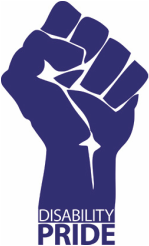Within stuttering communities, the discussion of whether stuttering should be considered a disability is complex. Some stutterers identify as disabled, and some do not. We at Did I Stutter understand dysfluency through the social model of disability, and identify ourselves as disabled. Conversely, the self-help movement is based on a medical model of stuttering and its followers largely reject the idea that stuttering is a disability. Identifying as disabled is a personal decision that should be the right of all stutterers. However, the portrayal of disability in self-help spaces makes clear the influence that speech pathology has on the self-concept of stutterers.
9 Comments
A big thanks to everyone who participated in #SpeechDiscriminationIs to raise awareness of speech discrimination! Check out some of the posts on our tumblr and twitter. My personal reflection on the day is posted here.
If you didn’t get a chance to post your story of speech discrimination yesterday, feel free to join in now on whatever social media you use, or in the comments below. -Josh October 22 is International Stuttering Awareness Day (ISAD). Every year this day brings a lot of press to the topic of stuttering, though what it is asking the world to be aware of is often left vague and open to interpretation. It can be used to remind people that stuttering exists, what stuttering is (and isn’t), or how to interact more respectfully with people who stutter.
This year, we’d like to use ISAD to raise awareness about Speech Discrimination. Anyone with a stutter, speech impediment, or communicative disability has experienced discrimination because of their speech. Whether you have been cut off or ignored in conversation, not offered accommodations in your school or workplace, or denied jobs, education, promotions, or leadership roles because of your voice, speech discrimination is an insidious and ever-present aspect of living with a communicative disability. It is harmful, it is ableist, and it is wrong. What’s more, many of those without disabled speech don’t even know that speech discrimination happens, or that they can be responsible for it. Let’s change this. We invite stutterers and others with communicative disabilities to join us on October 22 with the hashtag #SpeechDiscriminationIs Share your stories of how you have been discriminated against because of your voice. Point out the ableist standards, policies, and practices in your workplace or social circle. Let’s tell our twitter followers and facebook friends in no uncertain terms what Speech Discrimination Is, and let’s make sure they understand that it is absolutely not okay. Here’s ten to get things started: #SpeechDiscriminationIs not giving me jobs where I’ll have to speak to customers because you think my voice will embarrass you. #SpeechDiscriminationIs the media only including characters who speak like me if they’re portrayed as quiet and scared. #SpeechDiscriminationIs the teacher who asked me to sit down a third of the way through my presentation because my time was up. #SpeechDiscriminationIs the coworker who asked me to repeat myself four times because he was too lazy to try to pay attention. #SpeechDiscriminationIs the ADA making workplace discrimination illegal but only enforceable by complicated and expensive legal action. #SpeechDiscriminationIs complimenting me on how much “better” I sound on days I stutter less, as though my normal voice isn’t good enough #SpeechDiscriminationIs asking my partner to speak for me. #SpeechDiscriminationIs why I spent years too scared to raise my hand in class. #SpeechDiscriminationIs assuming that your way of speaking is inherently better or more desirable than mine. #SpeechDiscriminationIs telling me that I couldn’t possibly love my voice the way it is. |
Categories
All
AuthorsWe stutter and we're down with it. Archives
November 2018
|

 RSS Feed
RSS Feed
